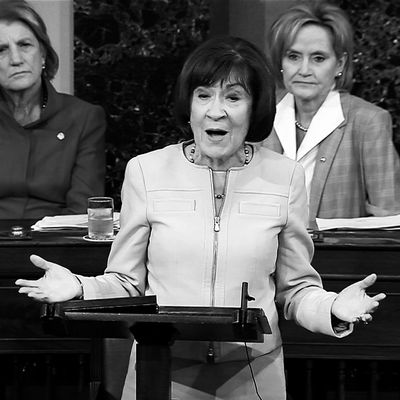
On Friday afternoon, Senator Susan Collins of Maine finally (officially) revealed that she intends to vote in favor of Brett Kavanaugh’s nomination to the Supreme Court. During a nearly 50-minute speech on the Senate floor, the Republican not only went on at length about the many reasons she wanted to confirm Kavanaugh — his judicial record, his tendency to refer to certain decisions as “settled precedent” — but she also betrayed the interests of the women and sexual-assault survivors she professed to support.
Collins opened by discussing the Senate’s role in considering judicial nominees. Its job, Collins said, is to “focus on the nominee’s qualifications as long as that nominee’s philosophy is within the mainstream.” Then came the matter of the sexual-assault allegations against Kavanaugh, as well as Christine Blasey Ford’s recent testimony about the assault she says she endured during high school. Collins said that she “believes” Ford is a victim of sexual assault — but, crucially, only to a degree. “I found her testimony to be sincere, painful, and compelling. I believe that she is a survivor of a sexual assault and that this trauma upended her life,” the senator said.
Collins continued, listing all the reasons why she doesn’t believe Ford: the lack of corroborating witnesses, the fact that Ford didn’t tell anyone at the time, that Kavanaugh has denied the assault. She proceeded to state that “the allegations fail to meet the more-likely-than-not standard.” (She also referred to Julie Swetnick’s allegation that Kavanaugh was present when she was drugged and gang-raped in high school as “outlandish.”) She said, “In evaluating any given claim of misconduct we will be ill-served in the long run if we abandon the presumption of innocence and fairness, tempting though it may be.”
But then, Collins did a 180. In a truly shocking turn of events, she went from explaining why Ford’s testimony wasn’t credible to emphasizing that we must believe people who say they are victims of sexual assault. She spoke of being shocked to find out that friends of hers were victims of assault themselves, and that she recently met with many survivors who told their harrowing stories. “Every person, man or woman, who makes a charge of sexual assault deserves to be heard and treated with respect,” she said. “The #MeToo movement is real. It matters. It is needed. And it is long overdue.”
But how can one profess to believe that something “matters” and is “needed,” and yet vote against a woman’s credible testimony in front of a Senate committee, vote against the sexual-assault survivors she spoke with, vote against believing women? How can one claim to be pro-choice and then allow herself to be played by a decidedly anti-choice nominee, whose record shows exactly how he will vote on abortion? How can she speak, with emotion, of the pain of hearing her friends share their own harrowing stories and of the courage that it takes to speak out about assault, and then downplay the assault, the laughter that Ford says is seared in her memory?
Collins is a hypocrite. She’s “pro-choice,” but voted for a person who has ruled against allowing a teen immigrant to have a abortion. She “supports” women and spoke out against Senator Al Franken when he was accused of sexual misconduct, but does not believe Ford’s claims against Kavanaugh. She benefits from convenience and entitlement; she’s happy to be an ally when it suits her agenda, but won’t hesitate to turn her back on those she purports to support the second it’s inconvenient.
The senator’s hypocrisy was met with immediate backlash online, with people calling Collins out for suggesting that Ford’s memories are incorrect. Another wished that Collins had saved us all time and just said, “These women are hysterical, I am voting yes” from the get-go. And after a surge of people rushed to donate to a PAC seeking to fund an opponent for Collins’s Senate seat, the website seemingly crashed. Collins speech indicates the inevitable conclusion of Kavanaugh’s nomination process, which will happen on Saturday when the Senate officially votes.


